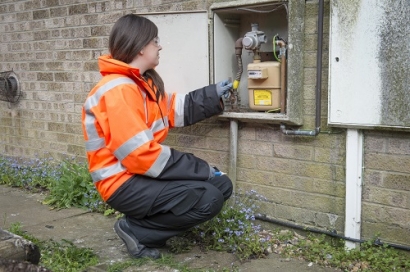
The four gas distribution networks (GDNs) which manage the pipes these plants connect to – Cadent, SGN, Northern Gas Networks and Wales & West Utilities – are joining forces to facilitate this anticipated growth in a gas that uses the nation’s waste and other ‘feedstocks’ to make grid-quality biomethane.
These plants stop organic waste from going to landfills, where it decays and produces gases more harmful to the environment than carbon. Instead, it’s used to make gas that heats thousands of homes and powers heavy goods vehicles.
In Cadent’s network area (covering North West England, the East of England, South Yorkshire, the Midlands and parts of the South East), the amount of biomethane currently entering the distribution pipes meets demand for heating 114,000 homes – the equivalent demand from a city the size of Coventry.
However, the plants have the capacity to increase output to meet local demand to volumes that would heat more than 190,000 homes. This is more than the supply needed to meet demand from a city the size of Liverpool or Manchester.
Plant developers are keen to take advantage of a tariff guarantee announced in May’s non-domestic Renewable Heat Incentive regulations. This promise from the government removed uncertainty for investors, but came with a deadline – it will only apply to plants commissioned by January 31st, 2020.
Tina Hawke, design manager and lead in this area for Cadent and chair of the Energy Networks Association’s biomethane group, said, “The evidence is now pointing to fast growth for biomethane – we know there are around 50 applications for new plants going through the system.
“This will provide safe, sustainable gas supplies for homes and businesses for decades to come, and help to reduce the country’s greenhouse gas emissions.”
There are currently 48 applications now with Ofgem for permission to operate new plants. This would take the number of UK plants from 98 to 146.
Charlotte Morton, Chief Executive of the Anaerobic Digestion & Bioresources Association, said, “The restoring of higher tariffs and introduction of tariff guarantees for the Renewable Heat Incentive will give the UK’s biomethane industry a much-needed boost.”
“We’re delighted to see the gas distribution networks working together to enable and support this anticipated growth in biomethane and commit to safely connecting every biomethane plant to the gas grid. This will allow these plants to provide the green gas that we as a country absolutely need to help decarbonize the gas grid and meet our climate-change targets.”
Claire Perry, Minister for Energy and Clean Growth, added, “The UK has led the world in cutting emissions whilst growing our economy – with clean growth driving incredible innovation and creating hundreds of thousands of high quality jobs.”
Biomethane is made when biodegradable matter, such as food waste, sewage, manures, or energy crops, is fermented in anaerobic digesters. This produces gas which can be used to heat homes and power heavy goods vehicles.
No changes are needed to the UK’s existing gas pipe network, or domestic appliances, to accommodate expansion of this source of green gas.

